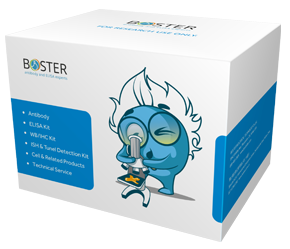Product Info Summary
| SKU: | EKC2199 |
|---|---|
| Size: | 1 kit, containing two 96-well plates and all necessary reagents |
| Reactive Species: | Human, Mouse, Rat |
| Application: | ELISA |
| Sample Types: | Cell lines |
Customers Who Bought This Also Bought
Product info
Product Name
p38 MAPK (Phospho-Thr179+Tyr181) Colorimetric Cell-Based ELISA Kit
SKU/Catalog Number
EKC2199
Size
1 kit, containing two 96-well plates and all necessary reagents
Description
The p38 MAPK (Phospho-Thr179+Tyr181) Cell-Based ELISA Kit is a convenient, lysate-free, high throughput and sensitive assay kit that can monitor p38 MAPK (Phospho-Thr179+Tyr181) protein expression profile in cells. The kit can be used for measuring the relative amounts of p38 MAPK (Phospho-Thr179+Tyr181) in cultured cells as well as screening for the effects that various treatments, inhibitors (ie. siRNA or chemicals), or activators have on p38 MAPK (Phospho-Thr179+Tyr181).
Storage & Handling
Store at 4°C for up to 6 months.
Cite This Product
p38 MAPK (Phospho-Thr179+Tyr181) Colorimetric Cell-Based ELISA Kit (Boster Biological Technology, Pleasanton CA, USA, Catalog # EKC2199)
Clonality of Antibodies
See Datasheet for details
Assay Range
> 5000 cells/well
Reactive Species
EKC2199 is reactive to MAPK14 in Human, Mouse, Rat samples
Validated Sample Types
Cell lines
Application Guarantee
EKC2199 is guaranteed for ELISA in Human, Mouse, Rat by Boster Guarantee
See how Boster Bio validate our ELISA kits: ELISA Validation Information
Kit Components
| Reagent | Quantity | Container |
|---|---|---|
| 96-Well Cell Culture Clear-Bottom Microplate | 2 Plates | - |
| 10x TBS | 24 ml (10x) | Clear |
| Quenching Buffer | 24 ml (1x) | Clear |
| Blocking Buffer | 50 ml (1x) | Clear |
| 15x Wash Buffer | 50 ml (15x) | Clear |
| 100x Anti-p38 MAPK Phospho-Thr179+Tyr181 Antibody (Rabbit Polyclonal) | 60 µl (100x) | Red |
| 100x Anti-p38 MAPK Antibody (Rabbit Polyclonal) | 60 µl (100x) | Purple |
| 100x Anti-GAPDH Antibody (Mouse Monoclonal) | 60 µl (100x) | Green |
| HRP-Conjugated Anti-Rabbit IgG Antibody | 12ml (1x) | Glass |
| HRP-Conjugated Anti-Mouse IgG Antibody | 12ml (1x) | Glass |
| Primary Antibody Diluent | 12 ml (1x) | Clear |
| Ready-to-Use Substrate | 12 ml (1x) | Brown |
| Stop Solution | 12 ml (1x) | Clear |
| Crystal Violet Solution | 12ml (1x) | Glass |
| SDS Solution | 24 ml (1x) | Clear |
| Adhesive Plate Seals | 2 Seals | - |
*The kit components are not available for individual purchase.
Materials Required But Not Included In Kit
- Microplate reader able to measure absorbance at 450 nm and/or 595 nm for Crystal Violet Cell Staining (Optional)
- Micropipettes with capability of measuring volumes ranging from 1 ul to 1 ml
- 37% formaldehyde (Sigma Cat# F-8775) or formaldehyde from other sources
- Deionized or sterile water
- Squirt bottle, manifold dispenser, multichannel pipette reservoir or automated microplate washer
- Graph paper or computer software capable of generating or displaying logarithmic functions
- Absorbent papers or vacuum aspirator
- Test tubes or microfuge tubes capable of storing 1 ml
- Orbital shaker
- Poly-L-Lysine (Sigma Cat# P4832 for suspension cells)
Data Examples, Quality Control Data

Click image to see more details
Boster Kit Box
Protein Target Info & Infographic
Gene/Protein Information For MAPK14 (Source: Uniprot.Org, NCBI)
Gene Name
MAPK14
Full Name
Mitogen-activated protein kinase 14
Weight
41293 MW
Superfamily
protein kinase superfamily
Alternative Names
protein;kinase p38-alpha;MAP kinase MXI2;MAP kinase p38;MAPK14;MAX-interacting protein 2;Mitogen-activated protein kinase 14;Mitogen-activated protein kinase p38;MK14;MXI2 MAPK14 CSBP, CSBP1, CSBP2, CSPB1, EXIP, Mxi2, PRKM14, PRKM15, RK, SAPK2A, p38, p38ALPHA mitogen-activated protein kinase 14 mitogen-activated protein kinase 14|CSAID-binding protein|MAP kinase 14|MAP kinase Mxi2|MAP kinase p38 alpha|MAX-interacting protein 2|cytokine suppressive anti-inflammatory drug binding protein|mitogen-activated protein kinase p38 alpha|p38 MAP kinase|p38 mitogen activated protein kinase|p38alpha Exip|stress-activated protein kinase 2A
*if product is indicated to react with multiple species, protein info is based on the gene entry specified above in "species".For more info on MAPK14, check out the MAPK14 Infographic

We have 30,000+ of these available, one for each gene! check them out.
In this infographic you will see the following information for MAPK14: database IDs, super-family, protein function, synonyms, molecular weight, chromosomal locations, tissues of expression, subcellular locations, post translational modifications, and related diseases, research areas & pathways. If you want to see more information included, or would like to contribute to it and be acknowledged, please contact us [email protected].
Specific Publications For p38 MAPK (Phospho-Thr179+Tyr181) Colorimetric Cell-Based ELISA Kit (EKC2199)
Hello CJ!
No publications found for EKC2199
*Do you have publications using this product? Share with us and receive a reward. Ask us for more details.
Recommended Resources
Here are featured tools and databases that you might find useful.
- Boster's Pathways Library
- Protein Databases
- Bioscience Research Protocol Resources
- Data Processing & Analysis Software
- Photo Editing Software
- Scientific Literature Resources
- Research Paper Management Tools
- Molecular Biology Software
- Primer Design Tools
- Bioinformatics Tools
- Phylogenetic Tree Analysis
Customer Reviews
Have you used p38 MAPK (Phospho-Thr179+Tyr181) Colorimetric Cell-Based ELISA Kit?
Submit a review and receive an Amazon gift card.
- $30 for a review with an image
0 Reviews For p38 MAPK (Phospho-Thr179+Tyr181) Colorimetric Cell-Based ELISA Kit
Customer Q&As
Have a question?
Find answers in Q&As, reviews.
Can't find your answer?
Submit your question




